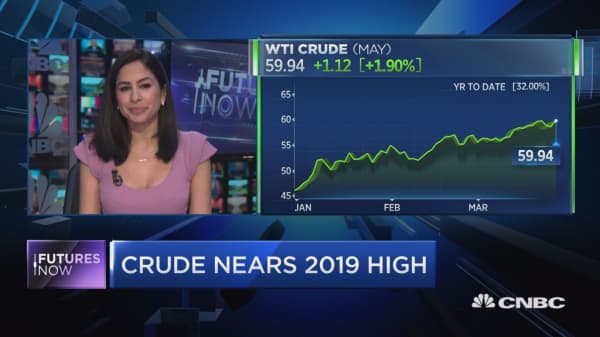Aboki News
Pound Faces Jolt as Local Elections Give Impetus to Brexit Talks - BLOOMBERG
-
Both main parties hit by Brexit backlash in local elections
-
Sterling could gain to $1.32 on a deal being reached: CIBC
The pound has climbed on optimism over a way forward on Brexit and next week may give the currency a decisive push, strategists say.
Sterling ended its best week in two months with a rally on Friday, following a battering in local elections for the two main political parties that could push them toward a Brexit compromise. The pound could either gain past $1.32 if an agreement is struck between the ruling Conservatives and the opposition Labour party, or fall back to $1.29 if Prime Minister Theresa May’s talks fail.
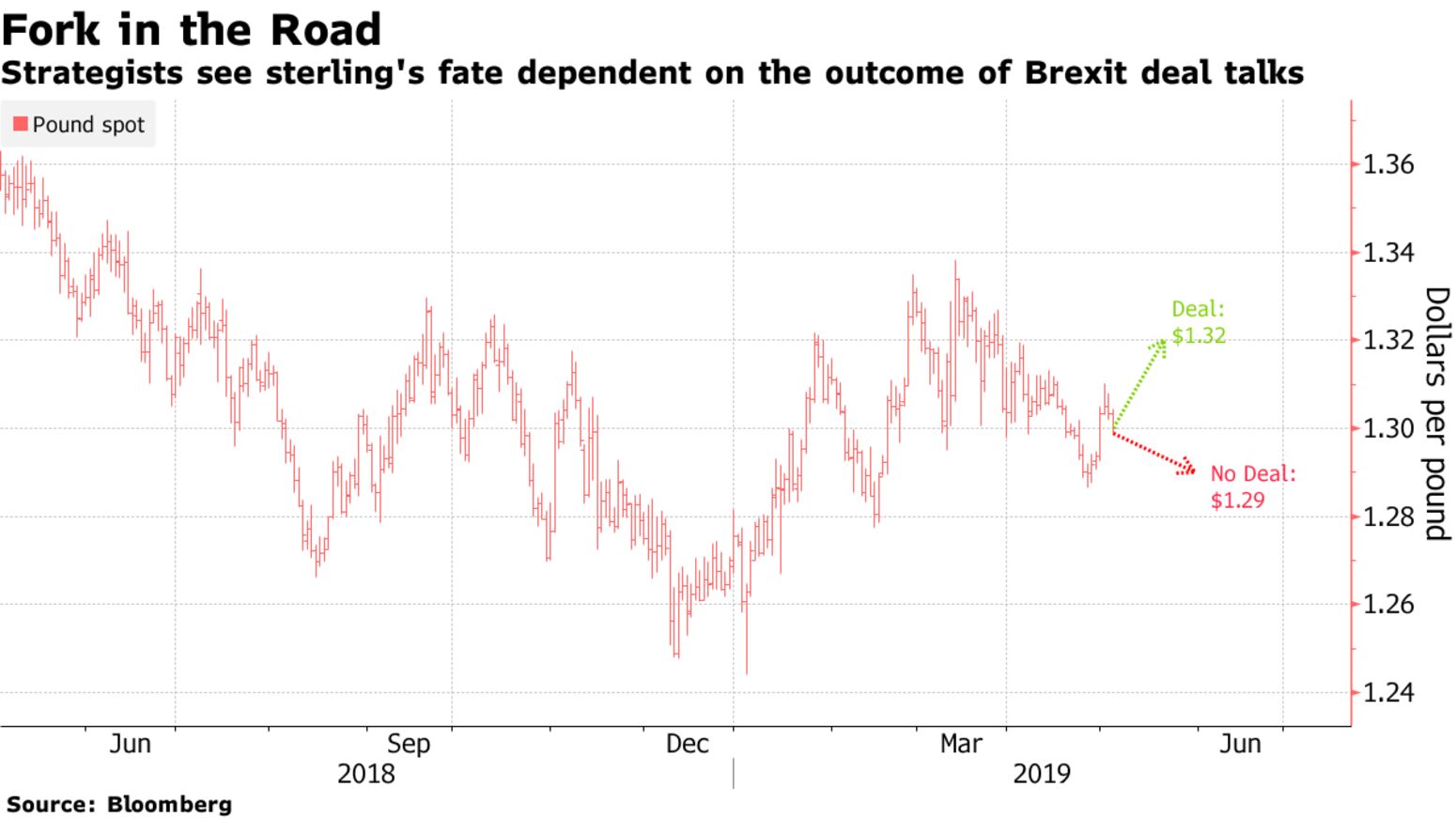
“Currently, cross-party talks are not making progress, but by the middle of next week expectations are that the government will make it a ‘take-it-or-leave-it’ moment for both sides to try and find a way through,” said Jordan Rochester, an analyst at Nomura International Plc. “If they were to find an agreement this would send the pound much higher as the market would price out any hard Brexit risk for October.”
Sterling surged above $1.31 Friday to head for its biggest weekly gain since March, yet is still well below its post-Brexit highs of around $1.43. Bets on pound gains over one month in options markets have turned positive for the first time in a year.
Investors are pinning their hopes for a resolution on the discussions between the two main parties, almost three years since the vote to leave the EU. The Tories and Labour both lost ground in local elections Thursday amid frustration over Brexit, which makes it in their interest to strike a deal. May and Labour leader Jeremy Corbyn both said that the message from the election was to sort out Brexit.
Why Labour Also Needs to Deliver Brexit
How Labour-held constituencies voted in the U.K. referendum
Sources: Brexit vote estimate from Chris Hanretty of UEA; Press Association 2017 election results
The outlook for the Bank of England’s interest-rate path also depends on Brexit. The market barely reacted Thursday to comments from BOE Governor Mark Carney that policy makers would raise rates by more than investors are pricing if Brexit goes smoothly.
Even though any agreement in the talks would have to get through Parliament, the pound would still gain further on the news, according to Jeremy Stretch, head of Group-of-10 currency strategy at Canadian Imperial Bank of Commerce. A “systematic failure” would have a similar impact in the opposite direction, pushing the pound down toward $1.29.
The cross-party talks are due to resume on Tuesday. Traders will also have U.K. growth figures in their sights next week, with gross domestic product expected to pick up to 0.5 percent in the first quarter, from 0.2 percent in the last three months of 2018.
Zimbabwe extends central bank governor's term by another five years - REUTERS
HARARE , May 3 (Reuters) - Zimbabwe’s President Emmerson Mnangagwa on Friday appointed John Mangudya for a second and final five-year term as central bank governor, a government official said.
Mangudya was first appointed to the post in 2014 but his term was marred by the bank’s decision to introduce the surrogate bond note currency two years later in a bid to end a severe shortage of U.S. dollars and cash.
“The extension takes effect from 1 May 2019 for another five years,” Misheck Sibanda, chief secretary to the president and cabinet said in a statement.
Mangudya’s appointment had been largely expected after Mnangagwa’s spokesman George Charamba said the governor would get a second term.
Zimbabwe is gripped by a severe shortage of dollars that has seen the country struggle to import food and medicines for hospitals. (Reporting by MacDonald Dzirutwe, editing by Louise Heavens)
Strategist Who Called Bitcoin Crash Says It's Time to Buy Crypto - BLOOMBERG
By Joanna Ossinger and Todd White
-
Fundstrat’s Robert Sluymer sees longer-term recovery in works
-
Rally through resistance around 6,000 could come later in 2019
Bitcoin is in the middle of a sustained recovery and investors should use recent weakness to buy more, according to Fundstrat technical strategist Robert Sluymer. The largest cryptocurrency climbed to its highest since November.
“Use pending pullbacks to continue accumulating Bitcoin in the second quarter in anticipation of a second-half rally through ~6,000 resistance,” Sluymer wrote in a note May 2. He sees Bitcoin’s rebound from its 200-week moving average and breakout from its first-quarter trading range as “the early stage of a longer-term recovery developing.”
Bitcoin advanced as much as 7.2 percent to $5,795.50 as of 9:33 a.m. in New York, according to Bloomberg composite pricing. The 55 percent jump in 2019 has helped pull rival tokens higher. Litecoin has soared more than two-fold.
Adding to the overall optimism Friday was a Wall Street Journal report that Facebook Inc. is reaching out to financial companies and online merchants to help launch a cryptocurrency-based payments system tied to the social network.

Sluymer warned in mid-November, when Bitcoin was trading around $5,500, that the asset had suffered “significant technical damage” that could take months to repair. Over the next several weeks, Bitcoin slid to as low as $3,136.04. In February, Sluymer cautioned that the technical position in the crypto space was still weak. Bitcoin didn’t recover the $5,000 level until early April.
Fundstrat was an early mover in analyzing cryptocurrencies and developed its own indexes. And Sluymer’s colleague, Fundstrat co-founder Tom Lee, is regarded as a Bitcoin bull. Lee started 2018 with a year-end price target of $25,000, before eventually abandoning time frames for his predictions in December when it was around the $3,000 to $4,000 range. Lee in March said he sees 2019 as a year the market can “build better risk-reward.”
“While it’s premature to conclude Bitcoin will not retest support near $4,300, we would encourage traders and investors to remain focused on the bullish longer-term technical profile developing,” Sluymer wrote. “Bottom line: use recent weakness to accumulate.”
(Adds report on Facebook in the fourth paragraph.)
Nigeria's missing: 'We want to know whether our sons are alive or dead' - THE GUARDIAN UK
Roughly 20,000 people have been detained by Nigeria’s military over the past decade, leaving their families fraught with anxiety
Global development is supported by
BY Shola Lawal in Maiduguri
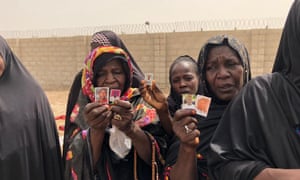
Women show photographs of relatives that have disappeared after being arrested by Nigeria’s military. Photograph: Courtesy of Jire Dole
It was on a chilly morning in October 2011 that Hajja Gana Suleiman’s world began to unravel.
The news came that her son had been arrested by military men. Mustapha “Saina” Abdulkareem had been saying his morning prayers at a nearby mosque when he was taken away.
The soldiers were conducting raids in the area and claimed to be arresting Boko Haram members. Saina, 25, was arrested together with 30 other men that day. It would be the last time Suleiman saw her son a free man.
Not knowing Saina’s whereabouts torments the 55-year-old mother. “I cannot sleep. I cannot eat. I’m old and tired. He helped me when his father was not well,” Suleiman says, sitting on a mat in her breezy compound in Gwange, a suburb of Maiduguri.
Two years ago, her pain drove her to help establish Jire Dole, a network of women who have missing relatives, and who campaign for justice.
Since 2009, Boko Haram’s deadly insurgency in Nigeria’s north-east has resulted in thousands of people going missing – either kidnapped or detained, or just disappeared. These include the 276 Chibok girls, whose abduction from their school in April 2014 sparked a global outcry.
But it is men and boys who have been largely unaccounted for. In a largely overlooked tragedy, thousands of men of fighting age have vanished in the conflict. Many have been killed by Boko Haram terrorists or forcibly taken as fighters.
Conversely, thousands more have been arbitrarily detained by soldiers on suspicion of being Boko Haram collaborators. Amnesty International estimates that, since 2009, about 20,000 men, including boys as young as nine, have been rounded up and detained without trial or due process. About 1,200 men have reportedly been killed.
Time has stood still for Suleiman and hundreds of mothers like her.
Efforts to free Saina prove futile. The day he was arrested, his wife, pregnant with their first child, asked where the soldiers were taking him. She was slapped and sent back to their home.
In the days that followed, Suleiman visited Giwa Barracks, a military detention centre in Maiduguri, anxiously trying to find her son. One week after his arrest, she saw Saina briefly. He wore red overalls. “This place is not good to stay,” he cried to his mother, distraught. “Please get me out. I’m suffering.”
Amnesty International has reported that many Boko Haram suspects are detained in the barracks in “inhumane’ conditions”.
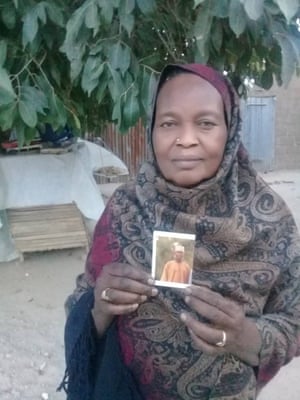
Hajja Gana Suleiman shows a photograph of her son. Photograph: Courtesy of Jire Dole
Several military men promised to release Saina after Suleiman paid 500,000 naira (£1,060) as a bribe. It was not the only time she paid out. “I’ve spent up to two million naira since they arrested him. I’ve sold my property and jewellery,” she says.
But her son has not been released, and she doesn’t know if he’s alive or dead. At one point, she was instructed by soldiers to wait at a morgue in case Saina’s body was among the dozens of corpses loaded into an ambulance out of Giwa Barracks every day. Suleiman waited to dig her son from the dead in vain. His body was not there.
In February 2012, Suleiman led a protest to the governor’s house in Maiduguri. She was assaulted. “Look at my body,” she says, lifting her clothing to show scars on her thighs. “The soldiers beat me and started shooting in the air.”
A top commander, Colonel Hassan, had promised to help. “He took my number and said he’d call me whenever they prepare the men for release. I never saw him again.”
As well as helping to form Jire Dole, she joined up with other groups, including the Knifar movement, an organisation of women seeking justice for sexual abuse they experienced at the hands of soldiers while in displacement camps.
Suleiman figured a collective fight would yield results. She began to announce her mission wherever women gathered – at meetings, weddings and child-naming events. “If you have this type of problem, please come to me. I will register you,” she would tell the women.
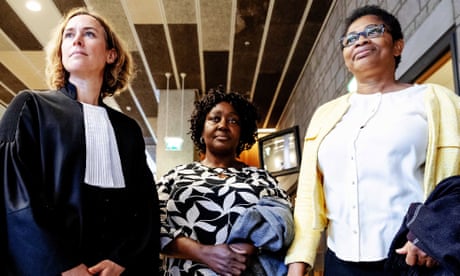
Dutch court will hear widows' case against Shell over deaths of Ogoni Nine
Read more
The response was huge. About 3,000 women have joined Jire Dole, Suleiman says, all looking for missing sons, husbands, brothers and fathers. The women have organised several protests. Although many of them are old and have little education, they attracted the attention of rights activists, who now amplify Jire Dole’s voice on social platforms.
The women have become each other’s support system. They donate money to members who need it and visit each other for companionship.
“Since I joined, my heart has been a bit calm,” says Fatima Al-Hassan, whose sons Ibrahim and Musa were arrested in a mop-up raid after a bomb exploded in the area.
“They were eating in the parlour,” Fatima says, pointing to a spot in her Maiduguri apartment.
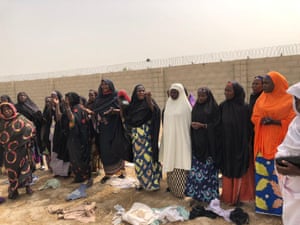
Jire Dole has empowered hundreds of women with missing relatives to demand justice. Photograph: Courtesy of Jire Dole
It seems the military is finally taking notice. Recent protests caught the attention of a top military commander. Jire Dole has been invited to the military headquarters for talks for the first time, although a date for the meeting has not been set.
It is unclear how many men are being held without charge in Giwa Barracks, or even how many are alive, says Isa Sanusi, Amnesty International’s media manager in Nigeria. In March 2014, Boko Haram attacked Giwa Barracks, freeing their members and other detainees. But in a reprisal attack, Nigerian troops hunted and killed hundreds of suspected escapees. More than 640men were killed.
“[The authorities] have to do something. We want to know whether they are alive or not,” says Suleiman, her voice cracking with emotion. “We want the truth.”
Brexit deal could be done in 'next few days', top Conservative says - REUTERS
BY Elisabeth O'Leary, David Milliken
ABERDEEN, Scotland/LONDON (Reuters) - Prime Minister Theresa May could reach a Brexit deal with the opposition Labour Party within days, a leading Conservative Party figure said on Saturday, after senior ministers urged compromise following poor local election results.
Britain's Prime Minister Theresa May speaks at the Scottish Conservative conference in Aberdeen, Scotland, Britain May 3, 2019. REUTERS/Russell Cheyne
Ruth Davidson, the Conservatives’ leader in Scotland, told party members that a cross-partisan agreement on Brexit was needed before this month’s European elections, or Britain’s major parties would face an even bigger backlash from voters.
The Conservatives lost 1,332 seats on English local councils that were up for re-election, and Labour - which would typically aim to gain hundreds of seats in a mid-term vote - instead lost 81.
Many voters expressed frustration at May’s failure to have taken Britain out of the European Union, almost three years after the country decided to leave in a referendum.
“If we thought yesterday’s results were a wake-up call, just wait for the European elections on the 23rd of May,” Davidson told a party conference in Aberdeen.
Speaking to reporters afterwards, she said there had been progress in the weeks of talks between the Conservatives and Labour to find a Brexit deal which passes parliamentary muster.
“There is a deal that could be done in the next few days ... and I really hope we can get to that point,” she said, describing the results as “a kick up the backside”.
Labour leader Jeremy Corbyn said on Friday there was now a huge impetus on every lawmaker to get a Brexit deal done.
But even if the Conservative and Labour Party leaderships reach a Brexit compromise, there is no guarantee that it will pass through parliament, which has roundly rejected May’s proposals three times already.
In an indication of the hostility May faces from the most pro-Brexit wing of her party, former leader Iain Duncan Smith renewed his call for her to step down soon, calling her a “caretaker prime minister” after the local election losses.
Complicating the picture, the main beneficiaries of the swing against the two major UK parties were the pro-EU Liberal Democrats, who campaigned on a demand for a new referendum, aiming to reverse Brexit.
“MOOD FOR COMPROMISE”
Health minister Matt Hancock urged pragmatism in a BBC radio interview earlier on Saturday.
“I think we need to be in the mood for compromise,” he said.
Foreign minister Jeremy Hunt also saw a “glimmer of hope” that there might be a deal with Labour soon.
But an EU customs union that prevented Britain from striking its own trade deals was not a viable long-term option for the world’s fifth-largest economy, he said.
Earlier on Saturday, Buzzfeed News reported sources saying that May was optimistic about a deal, and that behind closed doors the government had already compromised on a customs union.
“In the last week government ministers and officials presented Labour with a new offer on a customs arrangement that would effectively see the UK remain in the key aspects of a customs union with the EU,” the sources familiar with the talks said.
One source told Buzzfeed “the offer would be tantamount to the government accepting in full Labour’s demands”.
However, the sources did not think a deal was necessarily imminent, as Labour might wish to delay any agreement until after the European elections to maximize the damage to May.
The political editor of the Spectator magazine, which has close links to the Conservatives, said in a column for the Sun newspaper that there had been an agreement to an initial “comprehensive customs arrangement” very like a customs union.
Labour and the Conservatives would then leave open whether this would lead in future to Labour’s preferred customs union, with EU consultation rights, or the looser arrangement favored by the Conservatives.
It is unclear if the EU would approve a temporary customs deal, as border controls might later be needed between Ireland and Northern Ireland if the deal broke down.
Additional reporting by Elisabeth O'Leary in ABERDEEN and Kalia Shubham in BENGALURU; Editing by Gareth Jones, Ros Russell and Jan Harvey
Sanusi, Mbeki join MTN Board - PUNCH
BY Ife Ogunfuwa
MTN Group has announced significant changes to its Board of Directors with the Emir of Kano, His Royal Highness Sanusi Lamido Sanusi, resuming on the board by July 1, 2019.
Another Nigerian, the former African Union Commissioner for Political Affairs, Dr Aisha Abdulahi, also made the board as a member of the International Advisory Board whose operations will commence on July 1, 2019.
The group, in a statement issued by its Corporate Affairs unit on Friday, said the IAB would be chaired by a former President of South Africa, Mr Thabo Mbeki.
It said the restructuring had become necessary in view of “recent challenging regulatory environments and competitive trading conditions.”
According to the statement, a Kenyan national, Vincent Rague, will join the board effective July 1, 2019.
Other changes that will be effected over the next 12 months, according to the telecom company, is the stepping down of the Chairman of MTN Group, Phuthuma Nhleko, from his position on December 15, 2019, after ensuring a smooth transition of the Board and the establishment of the IAB.
It added that Mcebisi Jonas has been appointed Chairman-designate and would assume the position of Chairman of MTN Group effective December 15, 2019.
On the same day, MTN said Dr Khotso Mokhele would assume the responsibilities of Lead Independent Director while Alan Harper, Jeff Van Rooyen and Koosum Kaylan would step down from the Board after an orderly transition and handover to incoming directors.
“Peter Mageza and Dawn Marole will step down from the Board effective April 30, 2020,” MTN said.
The statement read in part, “The Board has resolved to establish an international advisory board of prominent persons of considerable and wide-ranging experience.
“The primary purpose of the IAB will be to counsel, guide and support the MTN Group from time to time in fulfilling its vision and objective of being one of the premier African corporations with a global footprint in telecommunications, contributing to increased digital inclusion in Africa and the Middle East, a pivotal aspect of the fourth industrial revolution.”
Nigeria's missing: 'We want to know whether our sons are alive or dead' - THE GUARDIAN UK
Roughly 20,000 people have been detained by Nigeria’s military over the past decade, leaving their families fraught with anxiety
BY Shola Lawal in Maiduguri

Women show photographs of relatives that have disappeared after being arrested by Nigeria’s military. Photograph: Courtesy of Jire Dole
It was on a chilly morning in October 2011 that Hajja Gana Suleiman’s world began to unravel.
The news came that her son had been arrested by military men. Mustapha “Saina” Abdulkareem had been saying his morning prayers at a nearby mosque when he was taken away.
The soldiers were conducting raids in the area and claimed to be arresting Boko Haram members. Saina, 25, was arrested together with 30 other men that day. It would be the last time Suleiman saw her son a free man.
Not knowing Saina’s whereabouts torments the 55-year-old mother. “I cannot sleep. I cannot eat. I’m old and tired. He helped me when his father was not well,” Suleiman says, sitting on a mat in her breezy compound in Gwange, a suburb of Maiduguri.
Two years ago, her pain drove her to help establish Jire Dole, a network of women who have missing relatives, and who campaign for justice.
Since 2009, Boko Haram’s deadly insurgency in Nigeria’s north-east has resulted in thousands of people going missing – either kidnapped or detained, or just disappeared. These include the 276 Chibok girls, whose abduction from their school in April 2014 sparked a global outcry.
But it is men and boys who have been largely unaccounted for. In a largely overlooked tragedy, thousands of men of fighting age have vanished in the conflict. Many have been killed by Boko Haram terrorists or forcibly taken as fighters.
Conversely, thousands more have been arbitrarily detained by soldiers on suspicion of being Boko Haram collaborators. Amnesty International estimates that, since 2009, about 20,000 men, including boys as young as nine, have been rounded up and detained without trial or due process. About 1,200 men have reportedly been killed.
Time has stood still for Suleiman and hundreds of mothers like her.
Efforts to free Saina prove futile. The day he was arrested, his wife, pregnant with their first child, asked where the soldiers were taking him. She was slapped and sent back to their home.
In the days that followed, Suleiman visited Giwa Barracks, a military detention centre in Maiduguri, anxiously trying to find her son. One week after his arrest, she saw Saina briefly. He wore red overalls. “This place is not good to stay,” he cried to his mother, distraught. “Please get me out. I’m suffering.”
Amnesty International has reported that many Boko Haram suspects are detained in the barracks in “inhumane’ conditions”.

Hajja Gana Suleiman shows a photograph of her son. Photograph: Courtesy of Jire Dole
Several military men promised to release Saina after Suleiman paid 500,000 naira (£1,060) as a bribe. It was not the only time she paid out. “I’ve spent up to two million naira since they arrested him. I’ve sold my property and jewellery,” she says.
But her son has not been released, and she doesn’t know if he’s alive or dead. At one point, she was instructed by soldiers to wait at a morgue in case Saina’s body was among the dozens of corpses loaded into an ambulance out of Giwa Barracks every day. Suleiman waited to dig her son from the dead in vain. His body was not there.
In February 2012, Suleiman led a protest to the governor’s house in Maiduguri. She was assaulted. “Look at my body,” she says, lifting her clothing to show scars on her thighs. “The soldiers beat me and started shooting in the air.”
A top commander, Colonel Hassan, had promised to help. “He took my number and said he’d call me whenever they prepare the men for release. I never saw him again.”
As well as helping to form Jire Dole, she joined up with other groups, including the Knifar movement, an organisation of women seeking justice for sexual abuse they experienced at the hands of soldiers while in displacement camps.
Suleiman figured a collective fight would yield results. She began to announce her mission wherever women gathered – at meetings, weddings and child-naming events. “If you have this type of problem, please come to me. I will register you,” she would tell the women.

Dutch court will hear widows' case against Shell over deaths of Ogoni Nine
Read more
The response was huge. About 3,000 women have joined Jire Dole, Suleiman says, all looking for missing sons, husbands, brothers and fathers. The women have organised several protests. Although many of them are old and have little education, they attracted the attention of rights activists, who now amplify Jire Dole’s voice on social platforms.
The women have become each other’s support system. They donate money to members who need it and visit each other for companionship.
“Since I joined, my heart has been a bit calm,” says Fatima Al-Hassan, whose sons Ibrahim and Musa were arrested in a mop-up raid after a bomb exploded in the area.
Advertisement
“They were eating in the parlour,” Fatima says, pointing to a spot in her Maiduguri apartment.

Jire Dole has empowered hundreds of women with missing relatives to demand justice. Photograph: Courtesy of Jire Dole
It seems the military is finally taking notice. Recent protests caught the attention of a top military commander. Jire Dole has been invited to the military headquarters for talks for the first time, although a date for the meeting has not been set.
It is unclear how many men are being held without charge in Giwa Barracks, or even how many are alive, says Isa Sanusi, Amnesty International’s media manager in Nigeria. In March 2014, Boko Haram attacked Giwa Barracks, freeing their members and other detainees. But in a reprisal attack, Nigerian troops hunted and killed hundreds of suspected escapees. More than 640men were killed.
“[The authorities] have to do something. We want to know whether they are alive or not,” says Suleiman, her voice cracking with emotion. “We want the truth.”
Developing countries need bigger FX crisis toolkits - BIS - REUTERS
BY Marc Jones
LONDON, May 2 (Reuters) - Emerging market countries need to expand their currency crisis fighting toolkits and be ready to embrace the kind of money printing tactics used in the U.S., Europe and Japan, the head of the Bank for International Settlements (BIS) was due to say on Thursday.
Agustín Carstens, who leads the influential central bank umbrella group, was due to say poorer countries’ vulnerability to FX volatility was now being compounded by the large stocks of internationally-mobile money chasing their higher interest rates.
He was due to say that while countries had been more active in recent years in FX intervention and introduced other ways of combating the swings, it was likely that overall more would be needed.
“Going forward, emerging market economy (EME) central banks will need to further develop their toolbox for dealing with the challenges of exchange rate and capital flow gyrations,” Carstens was due to say in a speech at the London School of Economics.
As part of it, the EM central banks may need to consider using asset purchases or asset swaps similar in nature to those used by the likes of the U.S. Federal Reserve, ECB and other parts of Europe and in Japan over the last decade.
ADVERTISEMENT
“EME central banks need to incorporate sufficient flexibility and sufficiently long horizons in the interpretation of their price stability mandates,” Carstens was also due to say, according to a text of his speech.
“That way, the longer-run risks to price stability posed by exchange rate-driven financial imbalances could be incorporated into the decision-making process, and short-term policy activism be avoided.”
He was due to warn too of so-called beggar-thy-neighbour exchange rate policies where countries try to push down their currencies to aid trade competitiveness.
“This charge bites hard, especially in the current political economy climate,” the former head of Mexico’s central bank was due to say.
“I have no easy answer here, except to say that this is a problem that besets some advanced economies as well as emerging market economies.” (Reporting by Marc Jones)
Oil price rally will continue into the next two quarters despite dip, experts say - CNBC
- Oil prices slipped Wednesday, interrupting a recent rally with news of sharply increased U.S. crude stockpiles.
- But it's a temporary blip in the broader outlook for the next two quarters of price growth, commodities experts told CNBC.
- The price of international benchmark Brent Crude is up 24 percent year to date while West Texas Intermediate is up 27 percent.
BY Natasha Turak | @NatashaTurak
Benjamin Lowy | Getty Images
Workers extracting oil from oil wells in the Permian Basin in Midland, Texas on May 1, 2018.
Oil prices slipped Wednesday morning, interrupting a recent rally with news of sharply increased U.S. crude stockpiles released by the American Petroleum Institute Tuesday night.
But it's a temporary blip in the broader outlook for the next two quarters of price growth, commodities experts told CNBC.
"We expect the rally in Brent prices will continue over Q2-Q3 this year as the market tightens further on the back of OPEC production cuts and deteriorating output in Venezuela," Edward Bell, director of commodities research at Dubai-based Emirates NBD, told CNBC in an email Wednesday.
Robin Mills, CEO of Qamar Energy and a nonresident fellow at Columbia's Center for Global Energy Policy, similarly sees prices remaining strong in the second quarter.
"Demand continues to be fairly good, OPEC+ compliance is high, the production cuts deal is planned to continue, output in Venezuela will keep deteriorating and Iranian exports are still under pressure," he told CNBC, noting that Russian compliance with the output cut deal is also increasing.
"If prices go 'too high', likely the U.S. will grant more Iran waivers, and if they don't then, with a lag, the Saudis will respond by increasing production within their overall cap."
Is an even bigger crude rally on the way? 1:56 PM ET Tue, 26 March 2019 | 03:08
International oil benchmark Brent Crude dipped 0.25 percent on Wednesday, trading at $67.80 a barrel at 11:22 a.m. London time. U.S. benchmark West Texas Intermediate was down 0.62 percent at the same time, trading at $59.57, after the API report revealed an inventory jump of 1.9 million barrels for the week ending March 22, obliterating market expectations for a drop of 1.2 million barrels.
Still, as Bell and Mills pointed out, prices are gradually rising year-to-date on the back of OPEC cut pledges coming to fruition and a worsening picture in conflict-ridden Venezuela, where the second power outage in a month has halted crude shipments coming out of the country's main oil port.
The price of international benchmark Brent Crude is up 24 percent year to date while West Texas Intermediate is up 27 percent in the same timeframe.
In the nearer term, inventory figures from both the U.S. and OPEC member states will continue to shape market sentiment, particularly as traders watch for the decline in U.S. rig counts since November to take effect.
Downward pressures by the end of the year
Conflicting forces of tightening global supply versus concerns over world demand have kept Brent crude in a narrow range over the course of March, trading within the window of roughly $64 to $68 per barrel.
Despite these supportive conditions, however, Bell expects prices to come down by the end of 2019.
"By the end of the year though we expect prices will slip from their current levels as OPEC production increases as member nations chase the market share ceded by declining production in Venezuela and other producers."
Futures Now: Crude nears 2019 high 1:57 PM ET Tue, 26 March 2019 | 01:23
And on the physical trading side, many executives at major oil companies aren't excessively bullish.
Shell's head of crude oil trading Mark Quartermain told the Financial Times on Tuesday that he saw the market staying in a range of $65 to $70 a barrel, while Ben Lockock, the co-head of oil for commodities trader Trafigura, told the paper he was only "gently bullish."
Analysts also point to the major unknown that is the direction of the U.S.-China trade war. Any failure in upcoming negotiations could trigger a sharp downturn in business sentiment and demand, particularly from an already-slowing China.
Talks will recommence in Beijing on Thursday. And while both sides are eager for a solution, U.S. President Donald Trump has already seemingly tempered expectations, saying last week that tariffs could remain "for a substantial period" and could more than double if the world's two largest economies don't manage to reach a deal.






